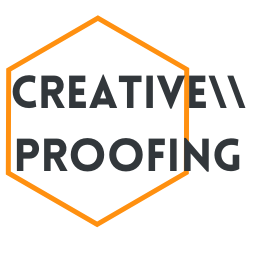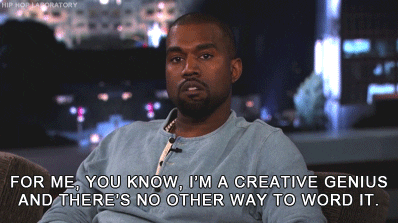I'm Megan J. Robinson, and this is Creative\\Proofing, a space to think, feel, and design out loud. Every Thursday I'll send you a newsletter exploring the intersection of creativity, spirituality, and productivity, and what that looks like for each of us. In each issue of Creative\\Proofing, I’ll dig into various questions, ideas, and topics by sharing what other thinkers, feelers, and doers have said, followed by my take, and then, what it do and what it mean for us going forward. I’ll also try to throw in reader feedback, recommendations, and maybe something I’m enjoying that week. I can't wait for you to join me.
This newsletter is currently ad-free, and just free. (If that changes in the future, I'll be sure to let you know.) You can reach me anytime by replying to this email, and if someone sent this to you, they may be asking you to sign up as well. You can do that by clicking here.
If you'd like to listen, you can also subscribe to the Creative\\Proofing podcast.
Express Yo'self
Previously in Creative\\Proofing, we took a very quick look at the topic of creativity, tracing the general contours of its history in Western culture, and how philosophers, engineers, design thinkers, and neuroscientists understand and explain this universally human impulse and practice. We also acknowledged that, in many cases, we don't necessarily understand ourselves as creative people, often due to messages we get from family, friends, teachers, and even our culture at large. Well, I'm here to change that, by golly.
Here's the thing: there has never existed, and never will exist again, anyone like you. The particular combination of interests, experiences, and insights that interact with the world in your life will never happen again. You occur once in a universe. And I want you to tell us about it.
A Quick Note
I work from within the Christian tradition, and understand the Divine as the Trinity of father, son, holy spirit. That said, I know we all have different ways of understanding the Divine, so if you wish to insert [Other] when I use that phrase, please feel free to do so. Understanding ourselves and others through the Enneagram seems to work well either way.
What Others Say
Let's start with imagination. Merriam-Webster defines imagination as "the act or power of forming a mental image of something not present to the senses or never before wholly perceived in reality." We can understand this process of "forming mental images" as providing what Trevor Hart calls "meaningful structure" to our lives. See, the world as we experience it with our raw senses is chaotic without this kind of ordering. Once random, multiple sense perceptions hit our conscious awareness, that's when we begin connecting those sense perceptions to our rational mind.
Think of small children encountering their world, or yourself in a different culture: the volume, diversity, and complexity of sounds, sights, smells, and sensations most likely overwhelmed you at first. Until you began to sort and categorize your experiences, connecting the new ones to your old ones, and then recognized patterns and similarities, nothing made sense. Here's the thing: you do that all the time, every day. What we experience through our senses becomes the reality we continually reorder or redescribe, which means that imagination is literally the "ground zero" of our entire mental capabilities and processes. So simply by existing, you bring imagination into the world. Pretty sweet, right?
Now, the intentional application or expression of imagination is creativity, "the ability to come up with or conceptualize ideas that are new, surprising, and valuable." I know I quoted Bernard Roth on creativity before, but he's worth quoting again.
All persons of normal intelligence possess some ability to think creatively and to engage themselves in imaginative and innovative efforts. Unfortunately, the average person's creative ability has been steadily diminished since childhood; this is a result of the societal pressures against individuality and lack of exercise of the creative faculties in daily life.
There's several reasons why most of us experience a diminished or rigid faculty for creativity, what Roth calls conceptual blocks. These blocks can be internal: our own capacity for perceiving, understanding, or responding to a given issue. They can also be external: what we're exposed to and surrounded by in our lives, as well as what's considered valuable or valid in our community and culture. We tend to think of "creativity" as those ideas or items that have a big impact on the world: things that completely upend the status quo or change the future. But most of the time, we experience creativity as new combinations of existing and familiar things, like a Roomba: it's a combination of a vacuum cleaner and a radio-controlled toy. **Who knew? But even if creativity isn't part of our regular awareness or routine, it's more accessible than we think.
Again, Roth notes that exercising our creativity follows some recognizable steps: we start off kinda sloppy and go in all directions, collecting information, resources, skills, and insights. Then, once we latch on to an idea or even a problem to be solved, we give some hard, intense, usually frustrated energy to figuring things out. After a while, we stop, probably give up, and give our attention to other things; while in the back of our minds, we're like a dog with a bone, constantly working on solving that idea. It's usually the case that the metaphorical light bulb comes on when you least expect it, and suddenly, you have The Solution!! As soon as you can, you rush to make it happen, pushing your ideas and efforts to their (inevitable) happy conclusion. Eureka — you've got it!
I hope that process sounds familiar to you. Did you ever realize you were engaging creativity? You totally were. Most of us probably apply our creativity to solving immediate, practical problems in our lives, and we absolutely need to do that. Much of life revolves around fixing issues. But what about less "practical" expressions of creativity? What does it look like to be creative in different ways?
All of these insights about imagination and creativity signal what I consider as a posture toward the world, a way of navigating and contributing to it. Every day, we encounter both the familiar and the new, and frequently ignore the insights that arise from our imaginative processing of these encounters. We're often encouraged to seek mastery in our lives: over topics, skills, and resources so that we can achieve results. But sometimes, that impulse toward mastery distracts us from exploring what's possible, interesting, or surprising. To be honest, exploration takes time, energy, and a willingness to experiment, leading us from the known and comfortable to the unknown and uncertain. Few of us find that easy to consider, let alone actually do.
Part of the impulse toward mastery of the game of Life also pushes us toward filling every moment of the day with activities that gain results and achievements. But, as much as we need to focus on specific ideas and issues to get things done, we also need to relax our attention, broaden our awareness. In other words, we need to slow down to daydream and smell the roses. In his book Wabi-Sabi, Leonard Koren suggests that, in slowing down, we focus on the present moment, noticing its impermanence and incompleteness. If you're human, you're probably conscious of how quickly we transition from one moment to the next. This moment — this one right now — can never be fully captured; our interaction with it will never be more than an imperfect snapshot.
Before we get too stuck in that cheery thought, consider that creating imperfect snapshots of incomplete moments is thereason we have books, music, movies, photographs, sketches, conversations, even social media. It's our way of saying, "Hey! I exist, and I connect with amazing, crazy, mysterious, ridiculous people and ideas and experiences and realities every damn day. And I just need to share it with you, to make sense of my life, and the universe, and what's possible in the world." Musician Nick Cave responded to a fan's question about whether or not it's worth it to make "shitty art," by saying that "creating art is about growing the world and increasing its reach, and it has more to do with the act of creation itself than what is actually made." Whether or not you believe that this world and human beings were intentionally made by a Divine creator, I think it's the impulse to express our once-in-a-universe self that makes our experience of the world possible. Your snapshots make it real.
What I Say
Whew. So. I say...all of the above?
Seriously, though, I've focused most of my life on the effort to understand why creativity matters so much to me, and how it connects with the Divine. I even went to seminary in the hopes of learning how to integrate faith and art, only to discover that they already are. My faith community growing up separated the two things, and left me feeling half a human for many years. Part of my journey through creativity has been to become more whole.
Even though I root my identity in being A Creative Person, it still takes practice. Some days, I cannot stand the thought of stringing poetic words together, or coming up with a new strategy for work. And some days, it's what keeps me going. "I exist, and I need to share it."
What's It All Mean?
As I mentioned earlier, accessing our creativity is easier than we think. If you're wondering about ways to do that, here's some suggestions from psychologist Ellen Winner in her book How Art Works. It's entirely likely that you've already developed what she calls "habits of mind," ways of perceiving and acting that actually transfer across different areas of knowledge. Next time you find yourself getting ready to solve a problem, consider how you can develop these habits to support even more creativity in your life.
Engage & Persist: when you find something that captures your attention, cultivate your inner motivation by persevering in that focus, maybe even if you think you've "mastered" it.
Envision: imagine what you can't directly observe, and follow the path from what you know to what might be possible.
Express: once you've learned the "rules" or techniques of a given craft or practice, break them your way.
Observe: pay attention, very close attention, to the world around you.
Reflect: review what you've done; develop your skills at explaining how you created something, and be able to evaluate and justify your choices.
Stretch & Explore: find the boundary of what you already know, and go past it; try something new, and when you fail, try again.
Let me know what you find out.
Creative\\Responses
Got a question, feedback, or something to share? All you have to do is reply to this email and write me! (Be sure to let me know if you want to remain anonymous, or if it's ok to use your first name.)
Creative\\Recommendation
For some prompts on sparking creativity, try The Art of Noticing, by Rob Walker.
Creative\\Enjoyment
A Deadly Education, by Naomi Novik. It's as if Hogwarts were ruled by Slytherin.
Tell your friends.
If you’d like to support Creative\\Proofing, the best thing to do is spread the word. If you think of five friends who might enjoy this, forward this email to them! Degrees of gratitude may vary, but please know, my gratitude is infinite.
You can share Creative\\Proofing on all the socials. You can also follow on Instagram @R21.5Coaching.
Shalom!





